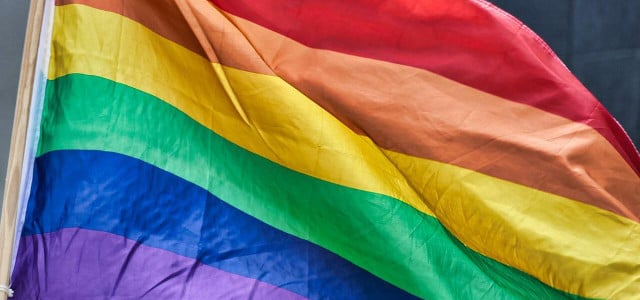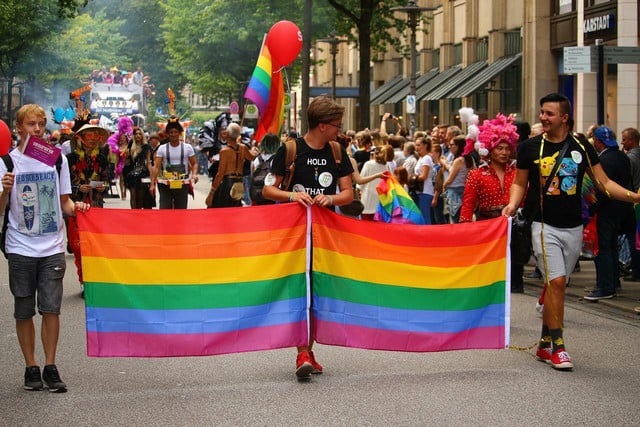
Rainbow washing refers to a marketing strategy used by companies that use the rainbow flag as an advertising medium. In this article you will find out what is problematic about it.
The rainbow flag is considered a sign of tolerance and acceptance of the diversity of life forms. That is why it has a particularly great symbolic power for the LGBTQIA+ community.
This was evident last summer in Munich, for example. In response to a controversial law passed in Hungary, the Bavarian capital wanted to have the Allianz Arena lit up in rainbow colors during a football match against the Hungarian national team. Hungarian law severely restricts information about homosexuality and transsexuality and prohibits companies from providing information or advertising about it. The European However, football association UEFA rejected the rainbow lighting and justified this with the religious and political neutrality of the organization. UEFA’s decision drew strong criticism from the LGBTQIA+ community in particular.
Showing or not showing the rainbow flag can therefore be a very clear statement. However, if companies only use this for marketing purposes, it becomes problematic – then rainbow washing takes place.
What is rainbow washing?
A business is rainbow washing when it promotes its products or services using the rainbow flag or colors without showing a genuine concern for the needs of the LGBTQIA+ community. This is especially so in June, when LGBTQIA+ communities around the world celebrate Pride Month, a popular promotional tool for companies looking to use the rainbow to build a progressive corporate image. So rainbow washing is a variation of the Social washingwith which companies pretend to be diverse and take care of social ills.
The US retail group Walmart serves as an example of rainbow washing. Walmart sells Pride products and publicly shows solidarity with the LGBTQIA+ community. In the summer of last year, however, it became known that Walmart is said to have supported anti-queer politicians with several million dollars.
In this case of rainbow washing, not only is it pretended to show solidarity with the LGBTQIA+ community, but anti-LGBTQIA+ lobbying is even taking place behind the scenes.
Why is rainbow washing problematic?

(Photo: CC0 / Pixabay / rihaij)
When the fashion industry produces rainbow clothes and cosmetics manufacturers put rainbow packaging on creams and shampoos, this creates awareness of the queer community and, optimally, helps educate society.
However, if companies only advertise with the rainbow during Pride Month, the LGBTQIA+ community benefits less than the company. Because commitment for only one month a year only creates short-term attention and no structural change. However, this would be necessary so that the queer community not only remains in the consciousness of society in the long term, but also so that society can remove the many hurdles, problems and human rights abuses that LGBTQIA+ communities around the world continue to face. Therefore, longer-term and structural measures are needed towards more justice, tolerance and equality.
Diversity is profitable

(Photo: CC0 / Pixabay / StartupStockPhotos)
A Finnish study from 2021 shows that an LGBTQIA+ friendly work environment has a positive impact on company performance. As a result, a socially progressive corporate culture leads to higher profitability and stock market valuation.
So this should be an incentive for companies not only to do rainbow washing, but to seriously advocate for diversity in the company.
The LGBT+ Diversity Index compiled by the Uhlala Group shows that some companies are already committed to such an endeavor. The index ranks the 30 companies in the German Stock Index (DAX) based on their measures for queer employees. The index is based on surveys on, among other things, an inclusive language, training courses to raise employee awareness and how to deal with discrimination in the workplace. The 2020 index shows that many of the companies surveyed have LGBTQIA+ on their agenda.
This is how you recognize Rainbow Washing
It’s not easy to distinguish Rainbow Washing from genuine interest and commitment.
The following points can Evidence of Rainbow Washing be:
- One company only advertises with the rainbow in June.
- One company has not launched any queer-friendly initiatives.
- A company does not donate to queer-friendly organizations.
- Queer employees are hardly included or are not hired.
- A company aggressively advertises with queer employees.
- A company advertises with the rainbow flag only in LGBTQIA+ friendly countries.
- A company supports anti-queer organizations or individuals.
In order to spot some of these indicators, it is necessary to take a closer look and not be blinded by a company’s loud advertising campaigns. Therefore, you should invest some time in doing some in-depth research to make sure a company’s engagement doesn’t turn out to be marketing after all.
This is what you can do against Rainbow Washing
For example, wearing a rainbow flag t-shirt shows your solidarity with the LGBTQIA+ community. However, you may only be supporting the fast fashion chain where you bought the t-shirt.
Here’s what you can do to really support the queer community:
- Talk to your friends and family about LGBTQIA+. In this way you create greater awareness and counteract discrimination based on sexual orientation.
- You can donate or even get involved with a queer-friendly organization.
- Research the company you are purchasing a rainbow product from. This way you don’t accidentally support Rainbow Washing.
Rainbow wash or pink wash?

(Photo: CC0 / Pixabay / marijana1)
pink wash is often used synonymously with rainbow washing. The transitions between the two concepts are blurred and Woke Washing also shows similarities.
The term “pink washing” was coined by US pharmaceutical and cosmetics companies that advertised their products with pink ribbons, the symbol of their commitment to breast cancer. However, the products were suspected of causing breast cancer.
However, pink washing is also often used in the context of the rainbow washing described in this article.
Other forms of social washing are: Green washing, blue wash or woke washing.
Read more on Techzle.com:
- LGBTQ – 6 films and series you should know about
- Relationships: monogamous, polygamous or LAT? The future of partnership
- Feminist literature: You should have read these 4 feminist books